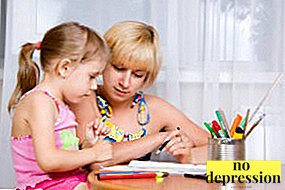Raymond Meredith Belbin is a scientist who owns research in constructive team roles.
is he formed hypotheses and tested them for seven years, has not yet derived effective formulas for predicting the behavior of people in a team setting.
Belbin's Theory

In a team that achieved success, with a high degree of probability, each participant was assigned an individual role and the duties corresponding to this role.
And in order to maximize the productivity of each individual team member, people must pursue both personal and collective goals.
But it happens that even competent setting of goals and distribution of roles do not provide the team with a positive result due to objective reasons:
- Participants do not have the flexibility to adapt to changing circumstances.
- People focus on the details, missing the opportunity to see the whole picture.
- One of the team members is experiencing negative emotions (irritation) in relation to the other participants and their activities.
Therefore, Belbin believed that it was easier to identify a team that would fail in the future than a winning team.
Axioms of success for the team:
- The presence of a leader who inspires confidence and can recognize and then correctly apply the abilities of people.
- The presence of a creative unit, gushing ideas.
- Equal level of intelligence among team members.
- All participants are predisposed to perform different roles, which eliminates the likelihood of competition.
- Participants correspond to their assigned roles and can cope with individual functional tasks.
- The disadvantages of teamwork are corrected in the process of cohesive activity and the redistribution of roles (based on the knowledge and personal characteristics of the participants).

Team Roles Classification
The classification includes eight roles. In turn, roles can be major and missing.
TO the main It includes the implementer, coordinator, motivator, supplier, generator of ideas.
If we compare these roles, we can see that they are antipodes or opposites, but at the same time constitute the "skeleton" of the team.
So coordinator seeks to assign participants personal places and achieve a harmonious state, and motivator seeks to break the balance in order to get colleagues to move forward.

The main roles allow you to effectively solve any tasks.
But because real people cannot focus only on an individual task, conflicts arise.
Smooth conflicts help missing roles These include the analyst, mastermind and controller.
In addition to the eight identified roles, combined in the classification, can be identified additional positions. These positions are occupied by industry experts who have expertise in any field (engineering, economics, etc.).
According to Belbin such people play the role "specialist". But experts are not included in the basic configuration of the team.
Therefore, despite the high value, they require high energy costs for the introduction of an additional element into the role model.
Characteristic
Implementer
Characteristic. Representatives of this role are prone to doing hard work and solving problems in a continuous mode. They are distinguished by a sober view of the situation and the ability to clearly control their own activities.

Implementers see themselves within the Company, as they often have identical values with this Company.
Selfish interests do not take implementers. Representatives of the role may be inexorable and cruel on the way to the goal.
Functionality. Implementers do well with organizational tasks and work directly.
Due to their reliability and diligence, they make a great contribution to the common cause. Efficiency allows you to ensure uninterrupted movement to the goal. Competence guarantees good results.
Coordinator
Characteristic. Representatives of this role feel people well and recognize talents from afar. They are able to give orders and seek their execution. Coordinators always have the baggage of experience and are respected by colleagues.
Role representatives are not always competent in terms of professional specialization, but they have the wisdom and good sensitivity to information.
Functionality. Coordinators are good at uniting the team, being at the head of people with polar characters.
Representatives of the role show the best results in tandem with colleagues close to them in rank. They can advise, control and reduce the conflict to zero by peaceful means.
Creator

Characteristic. Representatives of the role are predominantly extroverts, assertive and greedy for personal accomplishments.
Creators do not need to be motivated, because they easily find motivation within themselves.
They like to feel the leading element in the team and push others to action. Creators quickly bypass obstacles with the help of secret paths. The weak point of the creator is emotionality.
Representatives of the role can react very badly to failure. They also find it difficult to resolve conflicts because of the love of disputes and a keen desire to defend their position beyond compromise.
Functionality. The creator is good at the leadership post, due to the effectiveness and productivity under pressure. They are able to “hook” people with the right words, thereby encouraging team members.
Creators introduce an element of stability, taming passions. This ability is due to the lack of an emotional connection with similar problems.
Representatives of the role easily agree to change and do not deny the creative approach to solving problems.
In the leadership position, they seek to impose on people their own vision of the implementation of certain tasks. In this case, the creators have the highest efficiency indicator in the team.
Idea's generator

Characteristic. Generators are the most creative team members, bringing the spirit of novelty to the group.
They abandon traditional models, often separating themselves from the team in order to be left alone with their ideas and work productively.
Generators are susceptible to positive and negative criticism. They may not bring ideas to realization because of their radicalism and their own non-fulfillment and creative uncertainty.
Idea generators may succumb and get lost when communicating with colleagues or in group disputes, but they are distinguished by independence and originality as an independent unit.
Functionality. The main function of the generator is to offer and promote innovative ideas.
They sow grains, of which the rest of the team members grow problem solving. Representatives of the role often lead the process of opening new companies / organizations / industries.
Researcher
Characteristic. Perfectly find a common language with a variety of people. They have the ability to negotiate, process and analyze large amounts of information.
They do not specialize in the creation of ideas, but willingly and skillfully promote the ideas of command generators. Researchers are able to correctly apply the "improvised means" to achieve common goals.

They find opportunities even where other features do not recognize them.
But if the researcher does not receive an incentive from colleagues, his initiative is reduced to zero.
Functionality. They have a good sense of resources, going beyond the group in the search process. Well make contacts with the outside world.
Researchers always pass information through some kind of internal filter-analyzer, which allows to get rid of garbage and use the acquired knowledge to achieve team goals.
Expert
Characteristic. Experts have a thorough approach to solving problems, carefully weighing each of their actions.
They do not differ initiative and speed, but they almost always make the right decisions at the expense of a critical approach and maximum concentration on the problem.
Functionality. The expert is good at analyzing. He can sift out controversial ideas and suggestions, carefully studying and predicting the consequences.
Representatives of the role reach heights in their careers, as they rarely make mistakes. They seem insensitive and boring to others, as well as slow.
Diplomat

Characteristic. Diplomats are aimed at the team.
They are courteous and tactful, I will find a "key" to everyone. By their nature, diplomats easily adapt to any conditions.
Representatives of the role bathe in the rays of love and enjoy success in the team.
Functionality. Diplomats smooth sharp corners in a team, nullify disputes and conflicts. They are ready to work long and patiently in order to achieve a healthy emotional climate in the team.
Executor
Characteristic. Go to the task, bringing any initiatives to a logical result. They are taken only for those things that they can shoulder.
Artists are not able to distribute tasks and delegate affairs. But for work they do not need external stimulus and motivation.
Functionality. Needed by the team in situations where the tasks required require concentration and accuracy. Performers are attentive and self-sufficient.
During work, they often withdraw into themselves. Representatives of the role can be good leaders due to the desire for high performance and performance.
Where, how and for what is the instrument used?

Team Roles - the basis of productivity.
If you correctly identify the strengths and weaknesses of employees, and then assign them appropriate roles, conflicts, competition, inefficiency, passivity can be avoided from workers, etc.
Identifying team roles and the corresponding distribution of tasks within the team allows the correct use of human resources.
So a person predisposed to the role of a researcher will get the opportunity realize your potentialif you instruct him to collect and analyze data. At the same time, his desire to work will remain steadily high.
The reverse situation, in which a pronounced generator is defined for a position that implies the fulfillment of routine and routine tasks, will lead to a sharp decrease in productivity and performance.
Idea's generator can't get around its own nature and will be disappointed by the need to limit oneself to frames and creative inaction.
Roles can be defined through questioning or working with specialists (team trainers, psychologists).
In real life, there are no pure representatives of any role. As a rule, a person has a predisposition immediately to several role-playing command positions. Therefore, it is important to determine the dominant side and use it correctly to achieve common goals.
Summary of Belbin’s theory of “Team Roles”:



